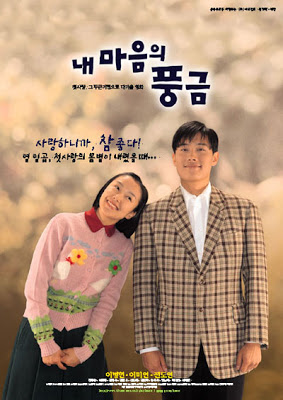Set in the rural Gangwon province of South Korea in 1962, The Harmonium In My Memory stars Lee Byung-hun (soon to be seen in the latest G.I. Joe movie) as an idealistic, newly graduated teacher dispatched to his first job away from his modern home of Seoul. Kang Soon-ha (Lee) soon catches the eye of a few of the locals – his high cheekbones and winsome smile are popular with the ladies, one of whom describes him as a “bachelor deserving of his title”, but none more so than one of his older pupils Hong-yeon (Jeon Do-yeon). Despite her best efforts to get his attentions, Hong-yeon seems almost invisible to Soon-ha and it soon clear why; Kang has began to nurture his own affections for another teacher at the school, the luminous Yang Eun-hee (Lee Mi-yeon).
In many other writer’s hands, The Harmonium In My Memory would follow the well tread plot of the bright eyed teacher using his idealism to help supposedly downtrodden children escape their environment; many of Kang’s pupils can read no better than they could at the start of their education and all are expected to graduate as border-line illiterate. Instead, Lee Young-jae’s smart script soon reveals that perhaps Kang’s idealism comes from his own naivety and that ultimately the teacher may have a lot to learn himself before he can impact any wisdom to anyone else.
Kang is a young man yet his feelings, and even how he behaves due to them, are not entirely different from that of Hong-yeon the teenage student. Whereas she spends her days wondering aloud why her teacher pinched her – was it a sign of affection? – Kang spends a similar amount of his time professing out loud his love, from first sight, of Eun-hee.
Yet one of the most remarkable notes of the films is his relationship with music; it is a simple and pure, unadulterated pleasure for him. He revels in the lost art of listening to music as a thing of pleasure in its self rather than simply using it to fill the silences whilst completing other tasks. He is a keen musician, he plays the titular harmonium, he composes, he dances – which causes rumours to fly round the school that he may have even hugged Eun-hee from behind – and no topic makes his face light up more than when he’s discussing his record collection of LPs he has acquired.
Kang reacts to a broken heart in much the same way as he does a broken record; both events constitute emotionally devastating moments for him and his reaction is not at all dissimilar to Hong-yeon’s own broken heart. Love, it seems, is a universal experience in the same way that music is and Young-jae demonstrates how both can fill their recipients with ecstasy and glee, or can fill their hearts with mourning and sorrow.
Boasting incredible performances from Jeon and Lee in particular, the movie is a sheer delight to look at and an immaculately heart warming piece. Much praise has to be given to Lee Young-jae’s direction which brings his immaculate script to life with a meditative pace, almost static camera and a succession of painterly images which bear much in common with Hur Jin-ho’s masterpiece
Christmas In August
.



Wow! What a lovely review Kieron! Love the detail of your descriptions... This sounds like the perfect film for when you feeling a bit under the weather and warm in bed. :-)
Reply DeleteWow - I'd say that's pretty much the perfect place for it!
DeleteThanks for the complements too - much appreciated!